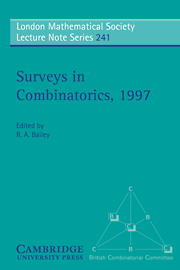Book contents
- Frontmatter
- Contents
- Preface
- M13
- The Harmonious Chromatic Number and the Achromatic Number
- Computer Construction of Block Designs
- Finite Quasiprimitive Graphs
- Tree Width and Tangles: A New Connectivity Measure and Some Applications
- Minor-monotone Graph Invariants
- Some Applications of Algebraic Curves in Finite Geometry and Combinatorics
- New Perspectives on Interval Orders and Interval Graphs
- Approximate Counting
- Author Index
- Subject Index
Preface
Published online by Cambridge University Press: 29 March 2010
- Frontmatter
- Contents
- Preface
- M13
- The Harmonious Chromatic Number and the Achromatic Number
- Computer Construction of Block Designs
- Finite Quasiprimitive Graphs
- Tree Width and Tangles: A New Connectivity Measure and Some Applications
- Minor-monotone Graph Invariants
- Some Applications of Algebraic Curves in Finite Geometry and Combinatorics
- New Perspectives on Interval Orders and Interval Graphs
- Approximate Counting
- Author Index
- Subject Index
Summary
The 1997 issue of the British Combinatorial Bulletin contains a short history, written by Norman Biggs, of the early years of the British Combinatorial Conference. The first one was held at Oxford in 1969. The sixth conference, held at Royal Holloway College in 1977, was the first at which a volume containing the invited talks was published in time to be available to participants at the conference. Peter Cameron was the pioneering editor of that volume. Such a volume has been produced for every conference thereafter.
The 1977 conference was also the first one that I attended. There I joined the British Combinatorial Committee, which was formally set up at that meeting although it had effectively existed for some years—the previous conferences didn't just organize themselves. As often happens, I found that being on the committee considerably widened my knowledge of the subject. I left the committee in 1981, but have never lost touch with combinatorial activity in Britain.
I was delighted when I was asked to edit the present volume. In spite of the work involved, I am still delighted. I have had a preview of nine magnificent papers, and come to know their subject matter much better than I would otherwise have done.
At the centre of this volume is a long paper by Bruce Reed about the tree width of graphs. This is a new measure of connectivity. It is intimately linked to the concept of a minor of a graph, which is obtained by erasing an edge or coalescing two vertices joined by an edge, or by a sequence of such operations.
- Type
- Chapter
- Information
- Surveys in Combinatorics, 1997 , pp. ix - xivPublisher: Cambridge University PressPrint publication year: 1997
- 1
- Cited by

